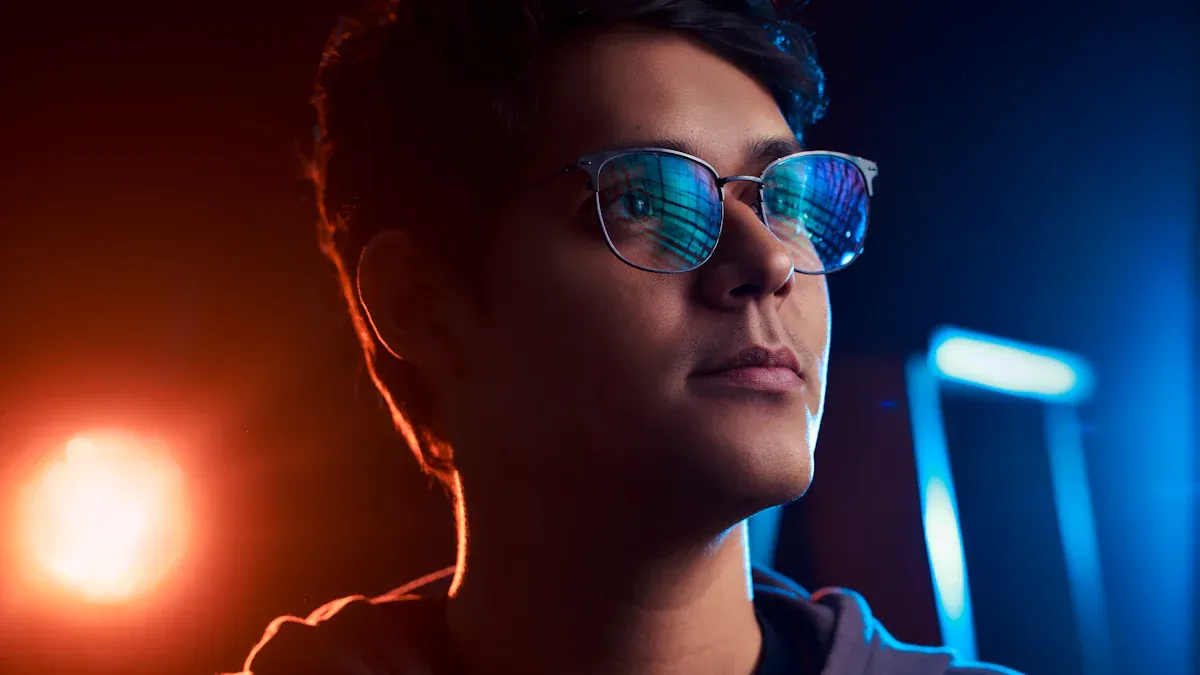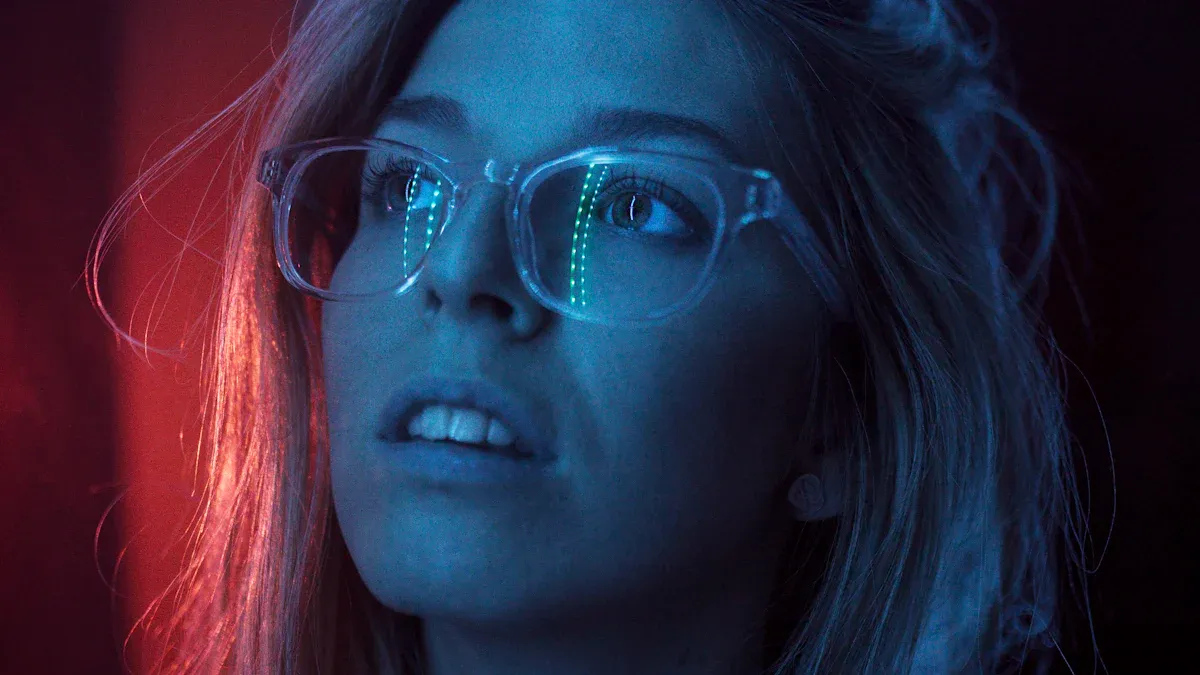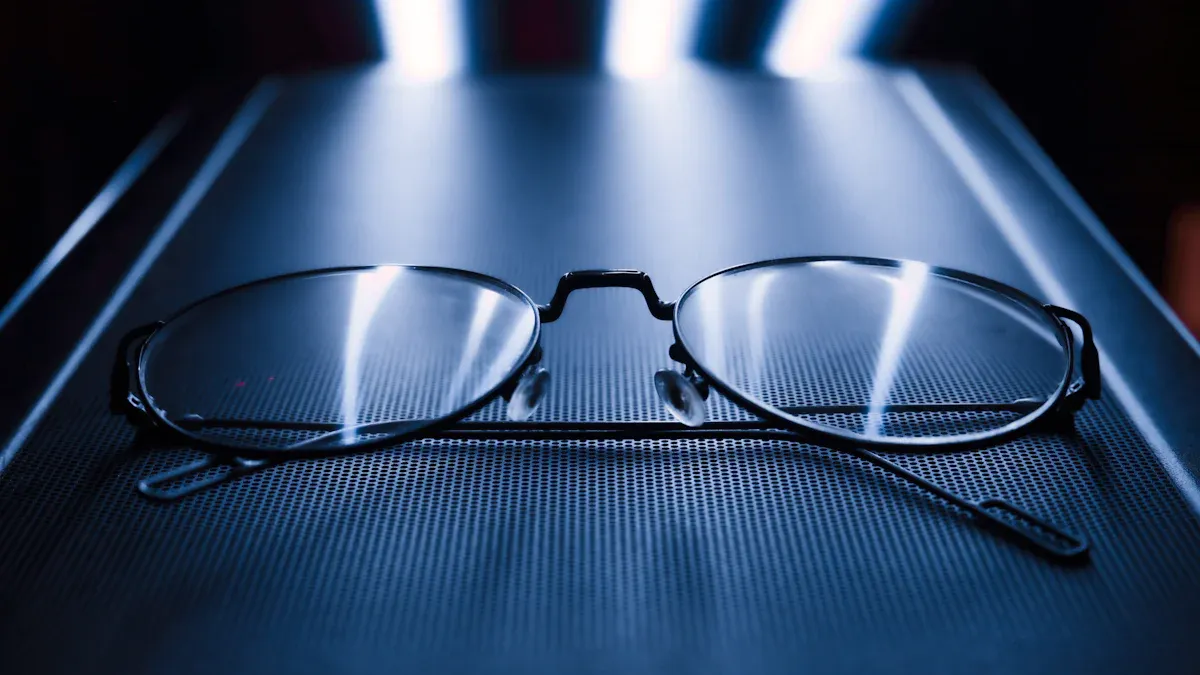
Blue-light-blocking glasses help block blue light from screens. They are useful if you use computers, tablets, or phones a lot. Blue light can affect your sleep by lowering melatonin. Melatonin is a hormone that helps control your sleep cycle. About 66% of people feel eye strain, like blurry vision or discomfort, after long screen time. These glasses absorb or filter blue light to ease eye strain. They also help you sleep better by reducing blue light exposure.
Key Takeaways
Blue-light-blocking glasses help reduce tired eyes from screens. They block harmful blue light, making it easier to focus and stay comfortable during long screen use.
Wearing these glasses at night might help you sleep better. They keep melatonin levels steady, which is needed for good sleep.
There are different kinds of blue-light-blocking glasses. Use clear lenses during the day and amber lenses at night for extra protection.
Use these glasses with healthy screen habits. Follow the 20-20-20 rule and take breaks to lower eye strain and feel more relaxed.
Ask an eye doctor if you're unsure about needing these glasses. They can give advice based on how much you use screens and any problems you have.
What is blue light?

Blue light is a kind of visible light. It has short wavelengths and high energy. Its range is between 400 and 500 nanometres. You see blue light daily from natural and man-made sources.
Sources of blue light
The sun gives off the most natural blue light. But man-made sources add a lot too. These include:
Screens on devices like phones, tablets, and computers.
LED lights, which save energy but emit blue light.
Fluorescent and traditional bulbs, though they emit less blue light.
Your eyes face blue light indoors and outdoors. Expert Richard Hansler says LEDs give off more blue light than fluorescent bulbs. This makes LEDs a big source of artificial blue light.
Effects of blue light on eye health
Too much blue light can tire your eyes. This is called digital eye strain. About 50% of computer users experience it. Symptoms include dry eyes, blurry vision, and headaches. Studies suggest blue light might cause long-term problems like macular degeneration. Some filters block up to 94% of blue light and may help reduce harm.
Blue light and sleep disruption
Blue light can mess with your sleep. It lowers melatonin, the hormone that helps you sleep. Using screens at night or before bed makes falling asleep harder. Research shows 68% of people use screens in the evening. Also, 58% use them within an hour of bedtime. This habit disrupts sleep and leaves you tired the next day.
What are blue-light-blocking glasses?
Blue-light-blocking glasses are special glasses that reduce blue light exposure. They are often sold to help with eye strain and sleep problems from screen use. These glasses work by blocking or filtering blue light from devices and lights.
Purpose and functionality
The main goal of these glasses is to protect your eyes from blue light. They aim to ease eye strain, improve sleep, and keep your eyes healthy. The lenses have a coating or material that blocks or filters blue light. Some glasses block all blue light, while others only block part of it.
Studies show mixed results about how well these glasses work. Many people say they see less glare and clearer screens. But some research shows they may not fully stop eye strain or improve sleep. Even so, many people still use them to feel more comfortable when using screens.
Types of blue-light-blocking glasses
There are different types of blue-light-blocking glasses for various needs:
Clear lenses: These block a small amount of blue light. They are good for daytime use and don’t change colours much.
Amber or yellow-tinted lenses: These block more blue light and are better for evenings. They may change how colours look but give stronger protection.
Specialised lenses for gamers or professionals: These are made for people who use screens for long hours. They often have extra features like anti-glare coatings.
A study in 2020 found that the effectiveness of these glasses depends on the brand. Some glasses block only a little blue light, while others block a lot. It’s important to pick a trusted brand like Phifinery, which focuses on eye care and eyewear.
Who should consider using them?
You might need blue-light-blocking glasses if you use screens a lot. This includes workers, students, and gamers. If you have dry eyes, headaches, or trouble sleeping after screen time, these glasses might help.
Some groups find them especially helpful. Athletes say they fall asleep faster with these glasses. People with conditions like bipolar disorder also report better sleep. However, scientists are still unsure how effective they are. If you’re not sure about using them, ask an eye care expert for advice.
How do blue-light-blocking glasses work?
Lens technology and blue light filtering
Blue-light-blocking glasses use special lenses to filter blue light. These lenses have coatings or materials that absorb certain light wavelengths. This reduces how much blue light reaches your eyes. It helps lessen its harmful effects.
New lens technology has made these glasses work better. For example:
A violet light filter reduced halos by 19%.
Glare and halos, called retinal veiling luminance, dropped by 17%.
Contrast in dim light improved by 13%.
Complaints about starbursts decreased by 45%.
Post-surgery starburst counselling fell by 72% with advanced lenses like Tecnis Symfony OptiBlue.
These improvements make the glasses better for reducing glare. They also improve comfort, especially in low light.
Partial vs. full blue light blocking
There are two types of blue-light-blocking glasses: partial and full blocking. Partial blocking glasses filter some blue light, mainly high-energy wavelengths. They are good for daytime use and keep colours looking normal. Full blocking glasses filter almost all blue light. They are better for evenings as they help with sleep by reducing melatonin disruption.
Choose based on your needs. If you use screens a lot during the day, partial blocking glasses may work. If you use screens at night or have trouble sleeping, full blocking glasses might be better.
How they differ from regular glasses
Blue-light-blocking glasses are different from regular glasses. Regular glasses fix vision problems like nearsightedness or farsightedness. They focus on making your vision clearer. Blue-light-blocking glasses protect your eyes from blue light. Their lenses filter or absorb specific light wavelengths, which regular glasses don’t do.
Studies show differences between the two types of glasses. For example:
Study |
Findings |
|---|---|
Palavets and Rosenfield |
Blue-light-blocking glasses filtered 99% of short-wavelength light but didn’t reduce eye strain more than regular glasses. |
Systematic Review of 17 Studies |
No big changes in eye strain or tiredness were found with blue-light-blocking lenses during computer use. |
Cochrane Review |
No major difference in distance vision between blue-light and non-blue-light lenses after 12 months; no data on contrast or colour changes. |
Regular glasses improve vision, while blue-light-blocking glasses reduce digital eye strain and sleep problems. They are helpful for people who spend a lot of time on screens.
Benefits of blue-light-blocking glasses

Reducing digital eye strain
Looking at screens for hours can tire your eyes. This is called digital eye strain. It can cause dry eyes, blurry vision, and headaches. Blue-light-blocking glasses reduce how much blue light reaches your eyes. Their lenses filter strong blue light, making screens easier to look at. You might see less glare and focus better with these glasses. They are helpful if you use screens a lot for work or school.
Supporting better sleep
Blue light from screens can make it harder to sleep. It lowers melatonin, the hormone that helps you sleep. Wearing blue-light-blocking glasses in the evening can help. These glasses block the blue light that affects melatonin. This helps your body get ready for sleep. Some studies show mixed results about their effect on sleep. For example, research on pregnant women found no big sleep changes with these glasses. Even so, many people feel calmer and sleepier after using them.
Long-term eye health benefits
Too much blue light may harm your eyes over time. It could lead to problems like macular degeneration. Blue-light-blocking glasses protect your eyes by filtering harmful blue light. This might lower the risk of damage to your retina. More research is needed to prove these benefits. But wearing these glasses daily could help keep your eyes healthy. They are an easy way to protect your vision in today’s digital world.
Common concerns about blue-light-blocking glasses
Are they scientifically proven?
You might ask if these glasses are supported by science. Studies show mixed results about their effectiveness. Some research says they reduce glare and make screens more comfortable. But a review of 17 studies with 619 people found no big drop in eye strain or better vision for most users. This means the benefits depend on each person’s needs.
Some people feel less tired after using these glasses. Others don’t notice much change. Experts agree more studies are needed to prove long-term benefits. For now, they are a popular way to ease screen discomfort.
Can they cause harm?
Blue-light-blocking glasses are safe but may cause small issues. Possible problems include:
Visual discomfort: You might feel headaches, dizziness, or slight eye strain at first.
Altered colour perception: The yellow lenses can change how colours look.
Behavioural changes: Some users feel irritable, distracted, or have sleep pattern changes.
These effects usually go away as you get used to the glasses. If problems continue, talk to an eye care expert for advice.
Are they necessary for everyone?
Not everyone needs blue-light-blocking glasses. If you don’t use screens much or have no symptoms, you might not need them. The earlier review shows their usefulness depends on the person. For example, people working long hours on screens or struggling to sleep may find them helpful. Others might not see much benefit.
Think about your screen habits and symptoms before deciding. If unsure, ask an optometrist for guidance.
Tips for managing blue light exposure
Making the most of blue-light-blocking glasses
To benefit from blue-light-blocking glasses, use them properly. Wear them regularly during screen time, especially in the evening. This helps keep melatonin levels steady and improves sleep. Take breaks from screens to reduce eye strain further. Follow the 20-20-20 rule: every 20 minutes, look at something 20 feet away for 20 seconds. This helps your eyes rest and feel less tired.
Changing your surroundings can make the glasses work better. Add more light to your room to lower glare and strain. Use anti-glare screen covers on your devices for extra comfort. If you spend hours on screens, eat healthy foods like leafy greens and fruits. These are rich in antioxidants and help protect your eyes from blue light damage.
Other ways to lower blue light exposure
There are other ways to manage blue light if needed. Start by changing your device settings. Turn on night mode or blue-light filters to make the screen colours warmer. This lowers blue light and makes it easier to use screens at night.
Cutting down screen time before bed also helps. Stop using devices at least an hour before sleeping. This gives your body time to make melatonin naturally. Create a relaxing sleep space with dim, warm lights in the evening. A dark, quiet bedroom can also improve your sleep quality.
Keeping your eyes moist is important too. Use eye drops or a humidifier to stop dryness from long screen use. Combine these tips with the 20-20-20 rule to ease eye strain. While blue-light-blocking glasses are useful, these methods give a complete way to handle blue light exposure.
Blue-light-blocking glasses lower eye strain and help with sleep. They filter some harmful blue light from screens. These glasses are not a complete fix. They work best with other steps, like reducing screen time and adjusting device settings. Research shows they block only 10% to 25% of blue light. Screens also give off low levels of blue light. Think about your screen use and any problems you have. This will help you decide if these glasses are right for you. Using them with good screen habits can protect your eyes and improve your health.
FAQ
When should I wear blue-light-blocking glasses?
Wear them while using screens, especially in the evening. They help your body get ready for sleep by reducing melatonin disruption. If you use screens for long hours during the day, they can also reduce eye strain.
Do these glasses work on all screens?
Yes, they work on most screens like phones, tablets, and computers. The lenses block blue light from digital devices and artificial lights. How well they work depends on the type of glasses you pick.
Can kids wear blue-light-blocking glasses?
Yes, kids can wear them if they use screens a lot. These glasses may protect their growing eyes from blue light. Check with an eye doctor to ensure the glasses are right for them.
How can I tell if I need these glasses?
If screens give you dry eyes, headaches, or trouble sleeping, these glasses might help. Think about your screen habits and symptoms. An eye care expert can give you advice based on your needs.
Are expensive glasses better than cheaper ones?
Not always. Some cheaper brands still block blue light well. Choose trusted brands with good lens technology. Read reviews and compare features to find the best pair for you.






